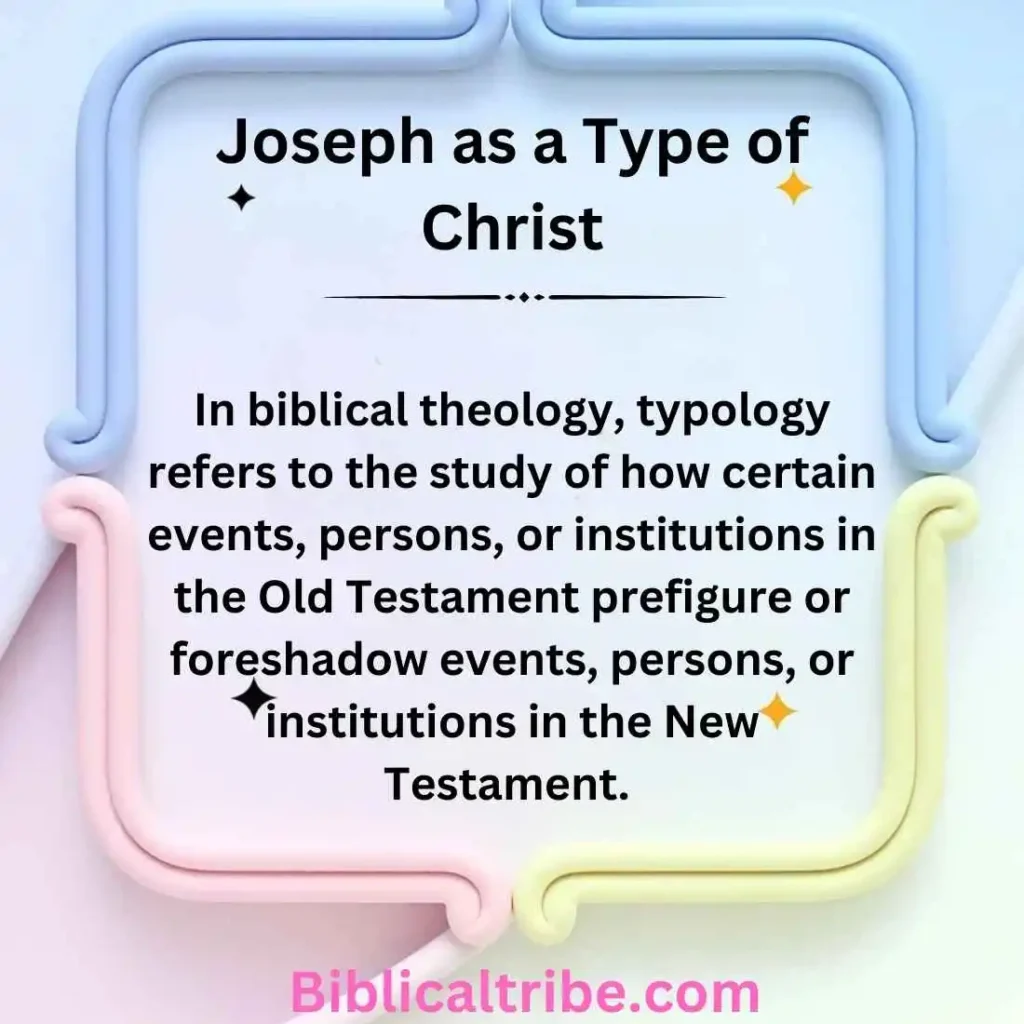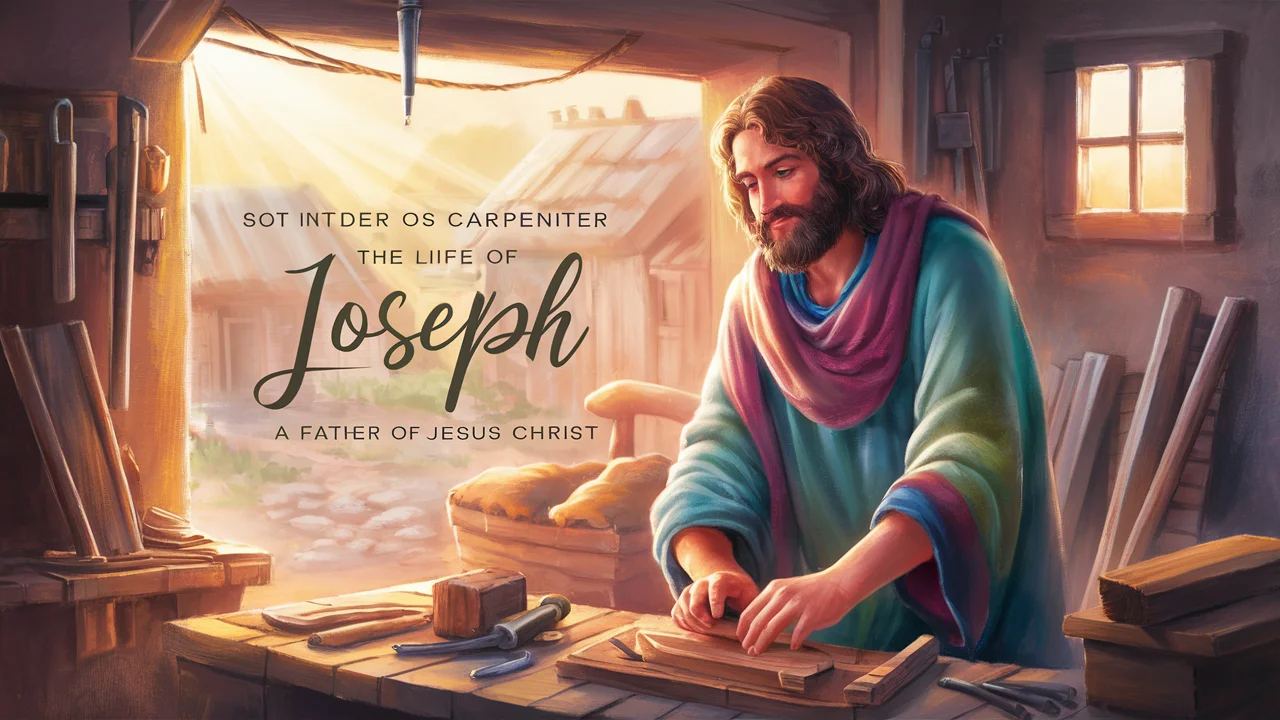Last Updated on November 27, 2024 by Ethan Richards
The life of Joseph, a pivotal figure in the Old Testament, offers profound insights into the story of redemption. His journey from betrayal to power is not just a tale of personal triumph, but a foreshadowing of the life and mission of Christ. Understanding the parallels between Joseph and Jesus deepens our appreciation of the Bible’s overarching narrative and highlights the continuity of God’s redemptive plan.
The Life of Joseph offers profound insights into his journey, showcasing how his struggles and triumphs mirror the prophetic picture of Jesus. By exploring the biblical parallels, this article unveils a deeper understanding of faith, purpose, and divine destiny. In 2025, uncover how Joseph’s story can inspire your personal walk with God and strengthen your faith.
This blog post explores the typology of Joseph as a precursor to Christ, focusing on key moments in Joseph’s life that mirror the life and mission of Jesus.
Joseph as a Type of Christ

What is Typology?
In biblical theology, typology refers to the study of how certain events, persons, or institutions in the Old Testament prefigure or foreshadow events, persons, or institutions in the New Testament. A “type” is a real, historical person or event that God has ordained to act as a preview or symbol of something greater to come in the future.
For example, the Passover lamb is a type of Christ, symbolizing the ultimate sacrifice that Jesus would make. In the same way, Joseph’s life serves as a type of Christ, with various aspects of his story prefiguring the life and mission of Jesus.
Key Parallels Between Joseph and Christ
Birth and Early Life
- Joseph was the favored son of Jacob, marked by his father’s special love and the gift of a multicolored coat (Genesis 37:3). This favor sparked jealousy among his brothers, leading to his eventual betrayal.
- Jesus was the beloved Son of God, whose birth was marked by divine favor and extraordinary signs (Matthew 3:17). Like Joseph, Jesus faced rejection from His own people, who were envious of His claim to divine authority.
Role of Suffering
- Joseph’s suffering was not incidental but central to God’s plan. His betrayal, slavery, and imprisonment were necessary steps that ultimately led to the salvation of many during the famine (Genesis 50:20).
- Jesus’ suffering was similarly essential. His rejection, crucifixion, and death were the means by which God accomplished the redemption of humanity (Isaiah 53:5).
Themes of Redemption
- Joseph became a source of physical salvation for his family and all of Egypt by providing food during a severe famine. His story is one of reconciliation and restoration.
- Jesus offers spiritual salvation to the world, reconciling humanity to God and restoring what was lost through sin. His life, death, and resurrection fulfill the promise of redemption that Joseph’s life foreshadowed.
Joseph’s Rejection and Slavery
Context of Rejection
Joseph’s story begins with a dream. He dreamt of his brothers’ sheaves of grain bowing down to his, and of the sun, moon, and eleven stars bowing to him (Genesis 37:5-11). These dreams, which suggested that Joseph would one day rule over his family, fueled the jealousy and hatred of his brothers. Their envy led them to plot against him, ultimately selling him into slavery.
- Parallels with Christ: Just as Joseph’s brothers rejected his dreams, the people of Israel rejected Jesus and His message. John 1:11 states, “He came to that which was His own, but His own did not receive Him.”
Sale into Slavery
Joseph’s brothers sold him for twenty pieces of silver to a group of Ishmaelite traders who took him to Egypt (Genesis 37:28). This act of betrayal echoes the betrayal of Christ, who was sold by Judas Iscariot for thirty pieces of silver (Matthew 26:15).
- Significance: The sale of Joseph into slavery symbolizes the rejection and betrayal that Christ would endure. It also foreshadows Jesus’ humility, as Philippians 2:7-8 describes Him “taking the very nature of a servant.”
Spiritual Significance
Joseph’s descent into slavery can be seen as a metaphor for Christ’s incarnation. Just as Joseph was brought low and made a servant in a foreign land, Christ left His divine glory to take on human flesh and dwell among us (John 1:14).
- Key Insight: Both Joseph and Jesus experienced a profound humiliation, but this humility was part of God’s greater plan for redemption. Joseph’s suffering led to the physical salvation of many, while Christ’s suffering led to the spiritual salvation of all who believe.
Joseph’s Imprisonment and Interpretation of Dreams
Unjust Imprisonment
After being falsely accused by Potiphar’s wife, Joseph was thrown into prison (Genesis 39:20). Despite his innocence, Joseph endured imprisonment for several years, but even in prison, God’s favor remained with him. Joseph was eventually put in charge of the other prisoners and became known for his ability to interpret dreams.
- Parallels with Christ: Like Joseph, Jesus was falsely accused and unjustly condemned. Despite His innocence, He was sentenced to death, a punishment He bore without protest (Isaiah 53:7).
Role of Dreams
While in prison, Joseph interpreted the dreams of Pharaoh’s chief cupbearer and chief baker, accurately predicting their futures (Genesis 40:8-22). His ability to interpret dreams was a gift from God and demonstrated Joseph’s continued faith and reliance on God even in difficult circumstances.
- Comparison with Christ: Jesus, too, revealed divine mysteries through His teachings and parables. He spoke of the Kingdom of God and the future judgment, offering insight into God’s plans and purposes (Matthew 13:10-17).
Significance of Patience and Faith
Joseph’s patience and faith during his imprisonment are notable. Despite the injustices he suffered, Joseph remained faithful to God, trusting that God had a plan for his life. His endurance in the face of adversity is a powerful example of faith.
- Lesson for Believers: Joseph’s story encourages believers to trust in God’s timing and to remain faithful even in the midst of trials. Just as Joseph’s suffering led to his eventual elevation, so too does the Christian’s suffering produce perseverance and hope (Romans 5:3-5).
Joseph’s Promotion by Pharaoh

Elevation to Power
Joseph’s life took a dramatic turn when Pharaoh had two troubling dreams that no one could interpret (Genesis 41:1-8). Recalling Joseph’s ability to interpret dreams, the cupbearer recommended him to Pharaoh. After interpreting the dreams, which predicted seven years of plenty followed by seven years of famine, Joseph was elevated to a position of great power. Pharaoh appointed him as second-in-command over all of Egypt, giving him authority to manage the nation’s resources during the impending famine (Genesis 41:39-41).
- Parallel with Christ: Joseph’s rise to power prefigures Christ’s exaltation after His resurrection. After enduring suffering and death, Christ was raised to life and seated at the right hand of God, given all authority in heaven and on earth (Philippians 2:9-11).
Role in Salvation
Joseph’s strategic management of Egypt’s resources not only saved the Egyptians but also his own family. During the famine, people from all over the region came to Egypt to buy grain from Joseph (Genesis 41:57). When Joseph’s brothers came to buy grain, they did not recognize him, setting the stage for a dramatic reunion and reconciliation.
- Spiritual Parallel: Just as Joseph provided physical sustenance during a time of famine, Christ offers spiritual sustenance to those who come to Him. Jesus declared, “I am the bread of life. Whoever comes to me will never go hungry, and whoever believes in me will never be thirsty” (John 6:35).
The Gathering of Nations
The famine brought people from many nations to Egypt, all seeking the sustenance that Joseph provided. This gathering of nations to Joseph can be seen as a foreshadowing of the gathering of believers to Christ.
- Fulfillment in Christ: Jesus’ ministry reached beyond the borders of Israel, offering salvation to people of every nation, tribe, and tongue. Revelation 7:9 describes a great multitude from every nation standing before the throne of God, a fulfillment of the gathering that Joseph’s story hints at.
Fulfillment of Promises and Resolution of Threats
Resolution of Family Conflict
One of the most poignant moments in Joseph’s story is his reunion with his brothers. After testing their character, Joseph revealed his identity and forgave them for their betrayal (Genesis 45:1-15). This act of forgiveness and reconciliation is a powerful reflection of God’s grace.
- Parallel with Christ: Just as Joseph forgave those who wronged him, Christ offers forgiveness to all who repent and believe in Him. On the cross, Jesus prayed, “Father, forgive them, for they do not know what they are doing” (Luke 23:34).
Fulfillment of Divine Promises

Joseph’s life is a testament to God’s faithfulness in fulfilling His promises. Despite the many challenges Joseph faced, God’s plan for his life was ultimately fulfilled. Joseph’s elevation to power and his role in saving his family were in line with the dreams God had given him as a young man.
- Comparison with Christ: Jesus’ life, death, and resurrection fulfilled numerous Old Testament prophecies, confirming God’s faithfulness to His promises. Christ’s victory over sin and death is the ultimate fulfillment of God’s redemptive plan, a plan that was foreshadowed in the life of Joseph.
Victory Over Sin and Death
Joseph’s story ends with a note of triumph. After revealing his identity to his brothers, Joseph assured them that what they meant for evil, God meant for good (Genesis 50:20). This statement encapsulates the theme of redemption that runs throughout Joseph’s life.
- Ultimate Fulfillment in Christ: Christ’s resurrection is the ultimate victory over sin and death. What appeared to be a defeat on the cross was actually the means by which God accomplished the greatest good—our salvation. As Paul writes in 1 Corinthians 15:57, “But thanks be to God! He gives us the victory through our Lord Jesus Christ.
FAQs
1. What is the connection between Joseph’s life and Jesus’ life in the Bible?
The life of Joseph is seen as a prophetic picture of Jesus Christ in several ways. Both Joseph and Jesus faced betrayal, endured suffering, and were ultimately elevated to positions of authority. Joseph’s journey from the pit to the palace mirrors Jesus’ suffering and resurrection, showing how his story foreshadows the redemptive work of Christ.
2. How does the story of Joseph relate to Jesus’ mission in 2025?
Joseph’s life holds significance for believers today as a prophetic symbol of Jesus’ mission to bring salvation and restoration. Just as Joseph reconciled with his brothers, Jesus’ sacrifice offers reconciliation to the world. This parallel is especially meaningful in 2025, as many are seeking deeper understanding of Christ’s prophetic role in the modern world.
3. Why is Joseph’s story considered a prophetic picture for believers?
Joseph’s life, with its dreams and divine interventions, provides insight into God’s plan of redemption. His experiences act as a prophetic type of Christ, illustrating how God uses hardship to prepare his servants for greater purposes. This theme is especially relevant as we approach 2025, when many are seeking hope through biblical prophecy.
4. How can understanding Joseph’s life strengthen my faith for the future?
Studying the life of Joseph encourages believers to trust in God’s sovereign plan. His unwavering faith despite betrayal and suffering reminds us that God is always working behind the scenes for our good. As we approach 2025, this understanding of divine purpose can inspire us to face our own challenges with hope and perseverance.
5. What key lessons from Joseph’s life can help Christians in 2025?
Joseph’s story offers essential lessons for Christians in 2025, such as the power of forgiveness, the importance of staying faithful through trials, and the assurance that God has a plan for each of us. By reflecting on his journey, believers can find hope in knowing that God is in control, even when circumstances seem bleak.
Conclusion
The life of Joseph is more than a historical account; it is a divine foreshadowing of the life and mission of Jesus Christ.
Through Joseph’s experiences of rejection, suffering, and eventual exaltation, we see a reflection of Christ’s own journey.
Joseph’s story teaches us about the importance of faith, patience, and trust in God’s plan, even in the face of adversity.
It also reminds us of the power of forgiveness and the fulfillment of God’s promises.

Matthew Porter combines his passion for theology with an extensive study of dreams. His analytical approach and eloquent writing style make complex interpretations accessible, helping readers uncover the hidden messages in their dreams and connect with their spiritual path.










